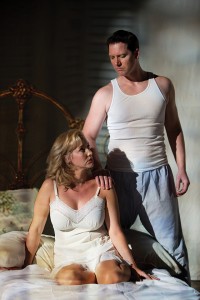Cat on a Hot Tin Roof
This Cat has claws
Mad Cow raises the roof on Tennessee Williams classic
Mad Cow Theatre, Orlando, Florida
From The Orlando Weekly, April 2, 2014
Almost everything in Cat on a Hot Tin Roof is big: Big Daddy, Big Mama, the family’s 28,000-acre plantation and the weighty issues of deception, repression, alcoholism, death and homophobia. Yet playwright Tennessee Williams often addresses these big issues in small ways, choosing unconventional and subtle approaches, thereby making the play deceptively difficult to perform. The cast of the new Mad Cow production is mostly up to the challenge, though, bringing the necessary Southern sizzle to Williams’ work.
Cat is the tale of Brick, a football hero just past his prime and falling into alcoholism. He hasn’t yet conceived a child with his wife, Maggie, because an almost unbearable issue from their recent past is tearing them apart. They’ve come to Brick’s ancestral home for the 65th birthday of Big Daddy, not just to celebrate the occasion but learn whether the family patriarch is dying of cancer. Throw in the histrionics of Big Mama and the overreaching greed of Brick’s brother, Gooper, who is eager to secure the plantation for himself, his shrew of a wife, Mae, and their five “no-neck monster” kids, you have a one-day portrait of a family on the brink of collapse.
This was Williams’ favorite play, with the issue of Brick’s ambiguous homosexuality being close to his heart. He liked it so much, in fact, that he revised the 1955 original in 1974, excising some minor characters and changing some language, and that’s the version Mad Cow is presenting. Most people, however, are more familiar with the brilliant film adaptation from 1958, directed and co-written by Richard Brooks and starring Paul Newman, Elizabeth Taylor and Burl Ives, the latter having originated the Broadway role.
Williams hated the movie because it presented a greater reconciliation between Big Daddy and Brick, and reduced the homosexual references to mere hints, to conform with the Hollywood Production Code. While it did dull the social and sexual commentary, it heightened the characters’ humanity, and many film buffs, including this reviewer, are partial to it. But any lengthy comparisons are best left to scholars of Williams. What matters now is that Mad Cow presents this version successfully.
With the small space of Mad Cow’s Harriet Theatre, William Elliott’s set, though well conceived, seems cramped, but clever lighting choices help offset the claustrophobia. The simple set decorations, costumes and musical transitions between acts represent the 1950s well while never being obtrusive or distracting, for it’s the performances, not the ambience, that are the stars, and those are handled with aplomb.
Bobbie Bell, celebrating 30 years of artistic work in Orlando, has brought together a competent cast. Though the first act drags, it’s not so much the fault of Summer Dawn Wallace, who plays Maggie with strength and sexuality, but of the tough script, which demands of her an almost uninterrupted monologue. Act two is stronger, with a powerhouse performance by Ron Schneider as Big Daddy and an almost equally solid one from David Jachin Kelley as Brick. Add memorable turns in the third act by Karel Wright as Big Mama, Stephen Middleton as Gooper and Amanda Leakey as Mae, in addition to some nice dialect work, and this turns into one of Orlando’s best recent Tennessee Williams productions.
© 2014 Orlando Weekly / MeierMovies, LLC
